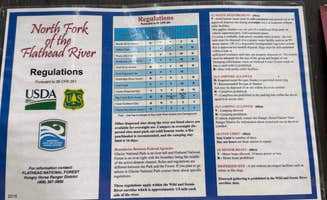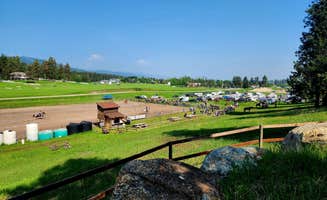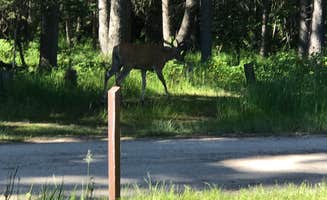Horse-friendly camping sites surround Columbia Falls at elevations ranging from 3,000 to 4,000 feet. Summer temperatures typically reach 80°F during the day and cool to 45-50°F at night. Most equestrian camping areas remain open from mid-May through September, with trails drying out by early June in most years.
What to do
Horseback riding at Glacier entrance: Near Glacier Campground, riders can access trails just minutes from West Glacier. "Staff went way beyond expectations when helping us deal with our reservation issues, which were fully our responsibility," notes Nat E., who appreciated the convenient location for day trips.
Riverside activities: The Glacier Rim River Access offers swimming and kayaking in deep blue water. "The river was very deep and a beautiful swim! However it's a heavily travelled road and the boat ramp was being used quite often," reports Sumner C., highlighting the popular water access point.
Winter horse trails: While most equestrian camping closes by October, several trails remain accessible for day rides through early winter. Trails connecting Columbia Falls to Whitefish maintain packed surfaces suitable for horses until heavy snowfall begins, typically in late November.
What campers like
Wide-open spaces for horses: Camp Whispering Pines provides ample room for equestrians. Charles Y. notes, "5 minutes to Rebecca Farms, 20 minutes to Under The Big Sky Venue, 20 minutes to Flathead and Whitefish Lakes, 40 minutes to Glacier National Park... Corrals for horses, 20 acres and an arena to stretch out."
Riverside camping: Many campers appreciate the river access points near Columbia Falls. At Glacier Rim, Albert V. shares, "This site is tucked away between the road and the river. It's super peaceful and there weren't many people around. Maximum stay is 3 nights. No signal."
Hot showers after trail rides: Several campgrounds offer shower facilities for riders returning from dusty trails. Taylor C. at Camp Whispering Pines raves, "The shower is amazing! Instant hot water for as long as you'd like."
What you should know
Limited dedicated equestrian sites: Camp Whispering Pines stands out for accommodating horses, but most other campgrounds have restrictions. Reserve well in advance during summer months, especially for groups with multiple horses.
Mosquito preparation required: Particularly at Bowman Lake Campground, insect protection is essential. Lora C. warns, "The mosquitos will about drive you nuts, and they're the reason I can't give this campground five stars. Bring bug spray (but not citronella; that attracts bears)."
Road conditions vary: Access to some camping areas requires navigating unpaved roads. For Bowman Lake, Stephanie T. advises, "When I say off the beaten path I should really be saying unpaved path. Make sure you have good shock absorbers on your vehicle, as it is miles and miles of dirt roads to get here."
Cell service limitations: Most horse-friendly camping areas have spotty coverage. At Glacier Rim, Tee C. notes, "I had one bar of Verizon service, so I could send and receive messages, but pics sent very slowly."
Tips for camping with families
Wildlife viewing opportunities: Kids can observe wildlife from safe distances at several campgrounds. At Moose Creek RV Resort, Cara B. found it "a super close drive to Glacier National Park. Nice family owned place, the staff was great!"
Morning lake activities: Early morning provides calm water conditions. At Bowman Lake, Max K. shares, "I couldn't sleep any more so I got up at 4:30, made coffee, and walked down to the lake about 5 am. It was like a painting."
Plan for weather changes: Mountain weather shifts rapidly, even in summer. Pack extra layers for children, as temperatures can drop 30+ degrees from day to night, particularly at higher elevations near horse trails.
Campfire restrictions: Fire regulations change throughout the season. Check current rules before arrival, as restrictions often tighten by mid-July due to dry conditions.
Tips from RVers
Site selection for horse trailers: At Johnson's Campground, space matters for equipment. "Make sure you bring an extension cord to hook up your electric just in case you have a short standard cord on your camper," suggests Marcus K., highlighting the need to plan for hookup locations.
Road navigation challenges: RVers towing horse trailers should research access routes. Heidi C. notes about Glacier Campground, "This popular campground is only one mile from the entrance to Glacier NP which makes it a good base camp when exploring and day hiking in the park."
Level site availability: Many campgrounds near Columbia Falls have sloped areas. Kevin O. at Mountain View RV Park found, "No shade in site 4. Mostly sunny in all spots," which matters when parking larger rigs with horses.
Dump station locations: Not all equestrian-friendly campgrounds offer sanitary dumps. Plan routes to access dump stations if staying for extended periods, as the nearest facilities may be 10-15 miles away in Whitefish or Kalispell.





